Guest blog by Mary Tinder, “Make Carlinville Beautiful”, and Co-Chair Bee City USA, Carlinville
Carlinville, Illinois is proud to have earned certification by the Xerces Society as the first Bee City USA affiliate in Illinois! We are a small midwestern town of 5,800 residents in south central Illinois. Our newly established Bee City USA Committee’s overarching goal is to become a “Mecca for Pollinators” by 2025, and we are well on our way. Our location on Old Route 66 brings visitors from around the world as they travel the Historical Mother Road from Chicago. “Make Carlinville Beautiful”, a small group of volunteers, plant and groom the newly established pollinator gardens planted in 2019–2020. Over six hundred native trees, shrubs, and perennials have been chosen and planted to entice the insects and birds in our region to stop by and stay awhile.

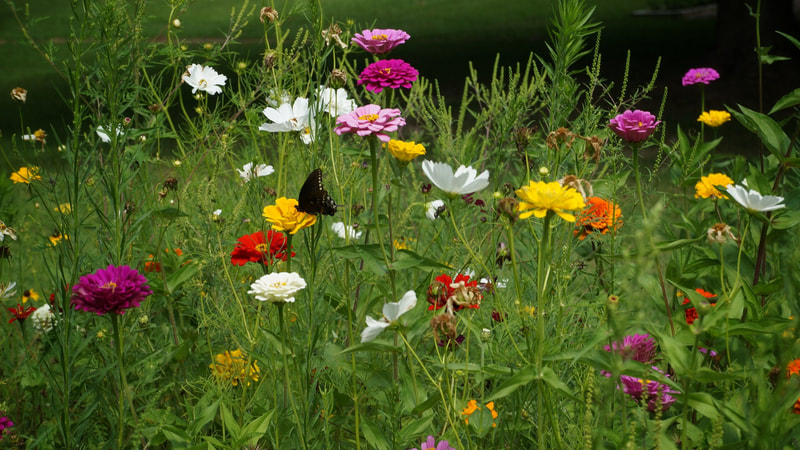
Pollinator Habitat
The Amtrak Pollinator Garden
The Amtrak pollinator garden is unique in that our city maintains the landscape for the train station. Mayor Demuzio and the Carlinville City Council were pleased that a small group of volunteers would take on the task of landscaping the station. We received their full support and trust in planning an attractive garden with plants donated by local gardeners and a memorial fund. It was this project that moved our interest in native plants and pollinators to advocacy. Soon, volunteers began investigating how to become the first Bee City USA affiliate in the State of Illinois, to complement our local Bee Campus USA affiliate, Blackburn University. Learn more about this garden and enjoy a before and after view in this video: https://youtu.be/_rcjE4etzk0.
The Amtrak Pollinator Garden
The Amtrak pollinator garden is unique in that our city maintains the landscape for the train station. Mayor Demuzio and the Carlinville City Council were pleased that a small group of volunteers would take on the task of landscaping the station. We received their full support and trust in planning an attractive garden with plants donated by local gardeners and a memorial fund. It was this project that moved our interest in native plants and pollinators to advocacy. Soon, volunteers began investigating how to become the first Bee City USA affiliate in the State of Illinois, to complement our local Bee Campus USA affiliate, Blackburn University. Learn more about this garden and enjoy a before and after view in this video: https://youtu.be/_rcjE4etzk0.
The Carlinville High School and Middle School Garden
The second large garden was planted at the Carlinville High School and Middle School as a “laboratory for learning”. Students from 6th to 12th grades have easy access to the garden for science and horticulture study. A total of six pollinator pockets are now established on the campus shared by the two schools and are maintained by site stewards, who are mostly students. Watch this video for an in depth look at some of the plants we chose for this garden: https://youtu.be/quHGNdUQ9-M.
The second large garden was planted at the Carlinville High School and Middle School as a “laboratory for learning”. Students from 6th to 12th grades have easy access to the garden for science and horticulture study. A total of six pollinator pockets are now established on the campus shared by the two schools and are maintained by site stewards, who are mostly students. Watch this video for an in depth look at some of the plants we chose for this garden: https://youtu.be/quHGNdUQ9-M.
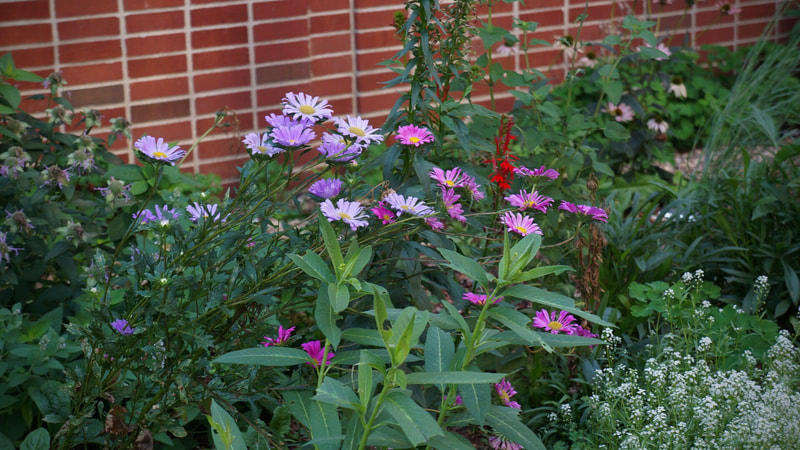
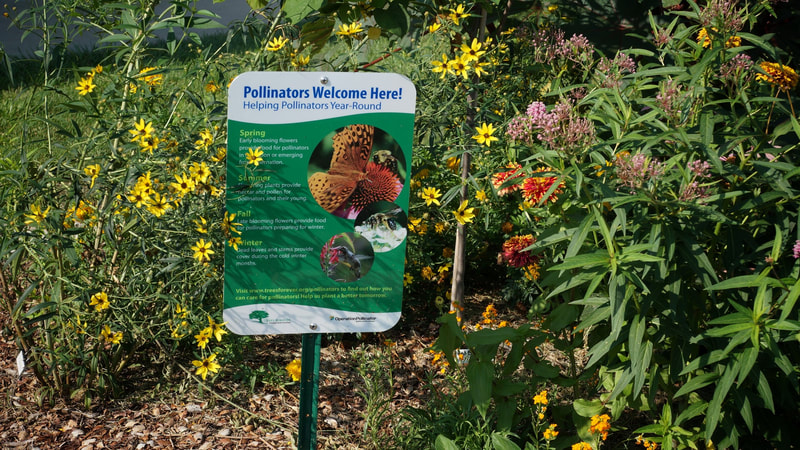

Granny Wilson’s Garden
Granny Wilson’s Garden is our third large demonstration garden in Carlinville. Planted in 2020, the 6’ x 100’ plot includes heirloom plants grown from seeds in a new local greenhouse. The site also contains eastern redbud, winterberry, snowberry, prairie rose, common milkweed, coneflowers, pussy willow, and over one hundred other blooming forbs that provide food for insects and birds well into snowfall. The vegetable garden, gracefully tucked in among the flowers has provided nearly seven hundred tomatoes and many helpings of green beans that we donate to the nearby food pantry.
Granny Wilson’s soil was hard packed clay, a border to a busy city street and blacktop parking lot. A curbed area was formed and the soil was dug out, removed, and replaced with compost and black dirt before being tilled. “Make Carlinville Beautiful” volunteers worked in natural nitrogen (sprinkles of grass clippings and a bit of dry cow manure) before the garden was planted. From this group of volunteers, the “girl power” team was born! A group of six local grandmothers handled most of the planting and mulching. Mulch was donated by a local tree trimming service, and in-kind donations were made by business owners. After the garden was established, site stewards were designated. Dana and John Yowell now care for the weeding, watering, and troubleshooting of this garden.
Click the link to hear from Mayor Demuzio and volunteers at our September 2nd Community Garden Tour and see the color and excitement in Granny Wilsons Garden: https://youtu.be/x1pmjZ9U6oI.
Granny Wilson’s soil was hard packed clay, a border to a busy city street and blacktop parking lot. A curbed area was formed and the soil was dug out, removed, and replaced with compost and black dirt before being tilled. “Make Carlinville Beautiful” volunteers worked in natural nitrogen (sprinkles of grass clippings and a bit of dry cow manure) before the garden was planted. From this group of volunteers, the “girl power” team was born! A group of six local grandmothers handled most of the planting and mulching. Mulch was donated by a local tree trimming service, and in-kind donations were made by business owners. After the garden was established, site stewards were designated. Dana and John Yowell now care for the weeding, watering, and troubleshooting of this garden.
Click the link to hear from Mayor Demuzio and volunteers at our September 2nd Community Garden Tour and see the color and excitement in Granny Wilsons Garden: https://youtu.be/x1pmjZ9U6oI.
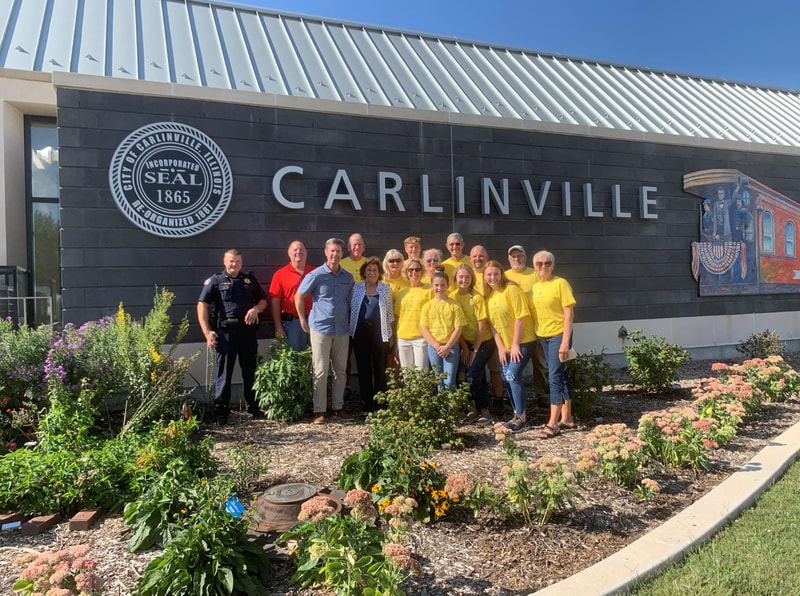

In addition to these areas we also have other pollinator gardens throughout town. All five Carlinville Plaza pollinator pockets and “Catalpa Row” are a partnership between Central Realty, the owner of the Carlinville Plaza, and “Make Carlinville Beautiful”, the volunteers who plant and care for new pollinator habitat within the city. You can now see colorful plantings near the local bakery, yellow finches flying from planters to the outdoor dining area, hummingbirds drinking from Cardinal plants, and families caring for the habitat.
Outreach & Successes
As volunteers, we educate about the need for new pollinator habitat and food sources for bees, butterflies, birds, beetles and yes, even bats through 1) social media including individual gardener’s Facebook posts and Carlinville Bee’s Facebook page, 2) the Carlinvillebees.org web site, 3) word of mouth, 4) letters to the editor, 5) presentations by Dr. John Marlin, Bee researcher at the University of Illinois, and 6) informal discussions including the original research by Dr. Charles Robertson, a Carlinville native, and author of numerous publications about local bees from 1886–1931. This sharing of information via technology and small groups is the best way to meet our goals and share our resources during COVID 19.
Our future plans for workshops or mini educational series include more tours in the demonstration gardens and partnering with the Macoupin County Master Gardeners, Rotary Interact Youth Club, Trees Forever, Blackburn College, and Tree City USA, Carlinville.
As volunteers, we educate about the need for new pollinator habitat and food sources for bees, butterflies, birds, beetles and yes, even bats through 1) social media including individual gardener’s Facebook posts and Carlinville Bee’s Facebook page, 2) the Carlinvillebees.org web site, 3) word of mouth, 4) letters to the editor, 5) presentations by Dr. John Marlin, Bee researcher at the University of Illinois, and 6) informal discussions including the original research by Dr. Charles Robertson, a Carlinville native, and author of numerous publications about local bees from 1886–1931. This sharing of information via technology and small groups is the best way to meet our goals and share our resources during COVID 19.
Our future plans for workshops or mini educational series include more tours in the demonstration gardens and partnering with the Macoupin County Master Gardeners, Rotary Interact Youth Club, Trees Forever, Blackburn College, and Tree City USA, Carlinville.
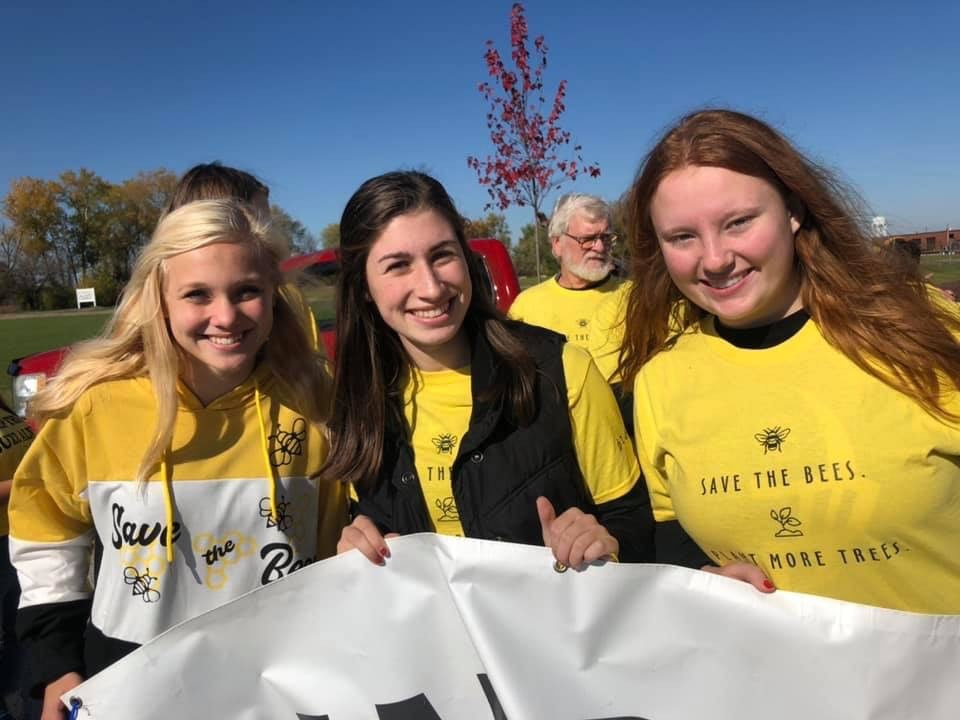
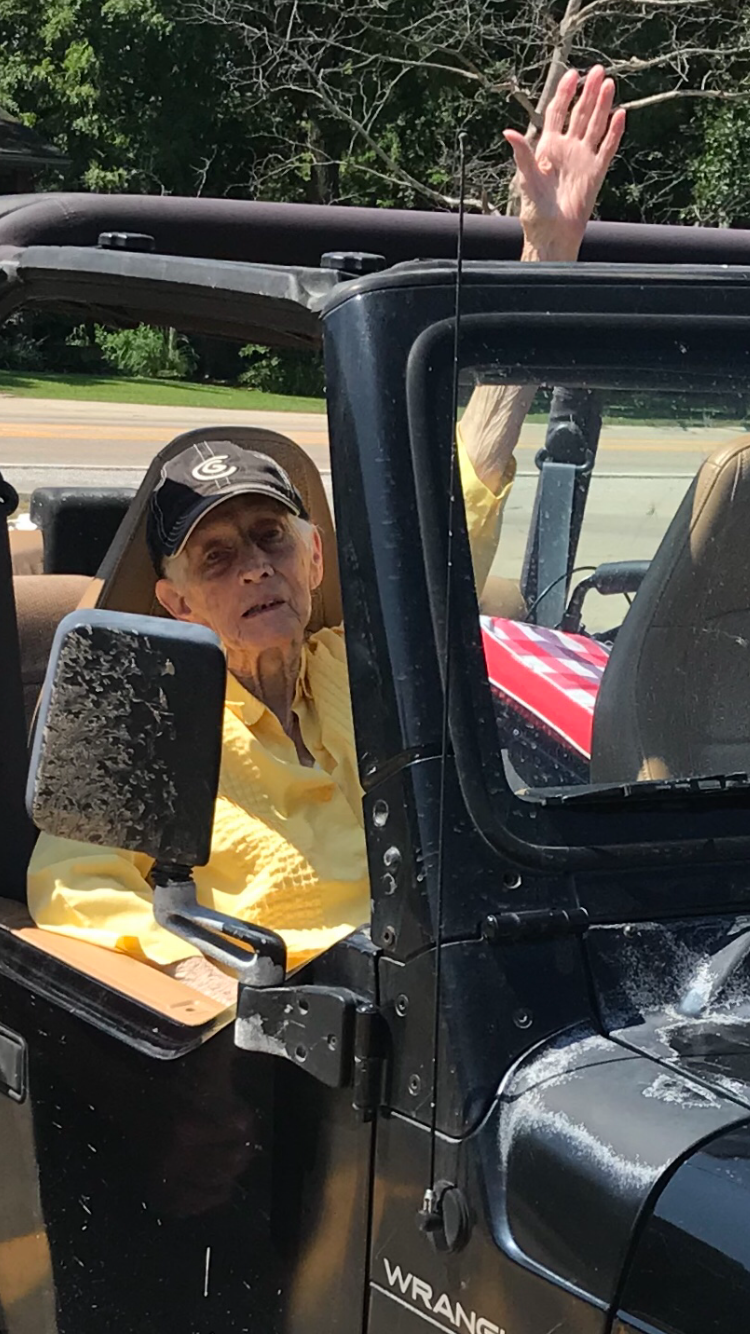
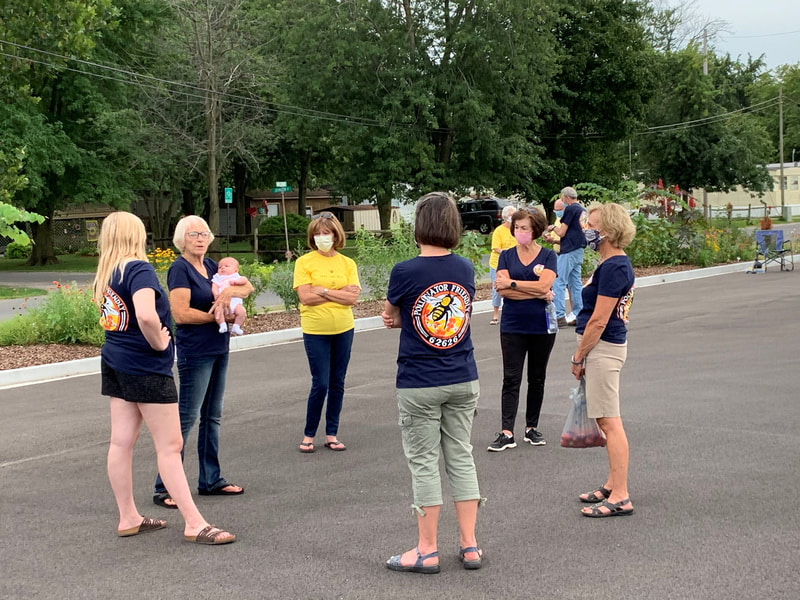
Funding & Awards
Although Carlinville has been an affiliate of Bee City USA for less than one year, we are proud of our ability to provide habitat and food for pollinators on public properties in our small town. Our early commitment to continue the work brought the realization that funding would soon become an issue. Researching grant opportunities began immediately and with a full green light from the Mayor and City Council, we applied for and received funding for pollinator habitat and conservation from Trees Forever and the Illinois Native Plant Society. The scope of our projects was recognized locally and regionally and soon led to honors and awards!
In 2019, “Make Carlinville Beautiful” volunteers received the “Outstanding Organization” award from the Carlinville Chamber of Commerce. In August 2020, our community received the “Outstanding Volunteer Award” from Trees Forever. Members of Bee City USA, Carlinville and Tree City USA, Carlinville received the award on behalf of all community volunteers. The honors recognized the forty trees planted in local parks and six hundred other native trees, shrubs, and perennials that were planted on public properties within the city.
Although Carlinville has been an affiliate of Bee City USA for less than one year, we are proud of our ability to provide habitat and food for pollinators on public properties in our small town. Our early commitment to continue the work brought the realization that funding would soon become an issue. Researching grant opportunities began immediately and with a full green light from the Mayor and City Council, we applied for and received funding for pollinator habitat and conservation from Trees Forever and the Illinois Native Plant Society. The scope of our projects was recognized locally and regionally and soon led to honors and awards!
In 2019, “Make Carlinville Beautiful” volunteers received the “Outstanding Organization” award from the Carlinville Chamber of Commerce. In August 2020, our community received the “Outstanding Volunteer Award” from Trees Forever. Members of Bee City USA, Carlinville and Tree City USA, Carlinville received the award on behalf of all community volunteers. The honors recognized the forty trees planted in local parks and six hundred other native trees, shrubs, and perennials that were planted on public properties within the city.
Taking Care: Site Stewards
In 2020, the scope of the projects grew considerably and it was beginning to be too much for Randy and Mary Tinder, who organized the “Make Carlinville Beautiful” volunteers, to haul water from home and handle the weeding at the various sites. The concept of “site stewards” was introduced to the City Council and was well received. Individuals and families were recruited by word of mouth and social media to help with weeding and watering. Today “Make Carlinville Beautiful” pollinator pockets, demonstration gardens, and new trees in our parks are cared for by local individuals and families. Our city square now contains 19 planters, each fully adorned with one or more native perennials that attract bees and other pollinating insects. The volunteers weed, water, and troubleshoot from April through October of each year. If problems arise, consultations with Master Gardeners are available.
In 2020, the scope of the projects grew considerably and it was beginning to be too much for Randy and Mary Tinder, who organized the “Make Carlinville Beautiful” volunteers, to haul water from home and handle the weeding at the various sites. The concept of “site stewards” was introduced to the City Council and was well received. Individuals and families were recruited by word of mouth and social media to help with weeding and watering. Today “Make Carlinville Beautiful” pollinator pockets, demonstration gardens, and new trees in our parks are cared for by local individuals and families. Our city square now contains 19 planters, each fully adorned with one or more native perennials that attract bees and other pollinating insects. The volunteers weed, water, and troubleshoot from April through October of each year. If problems arise, consultations with Master Gardeners are available.
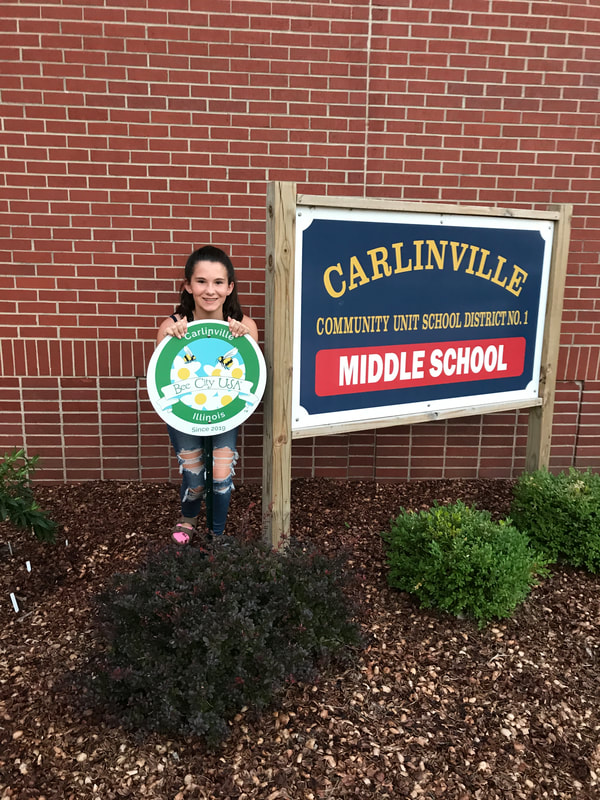
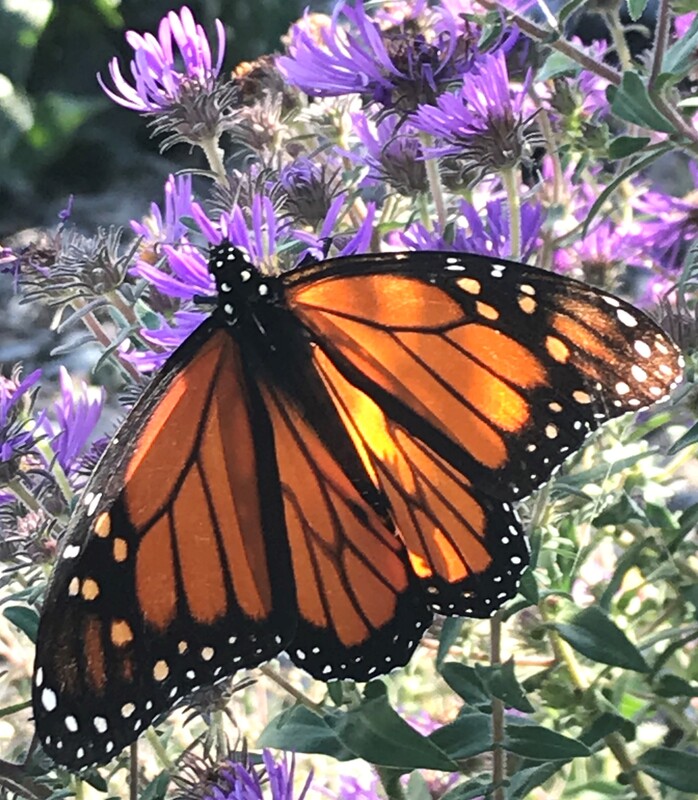
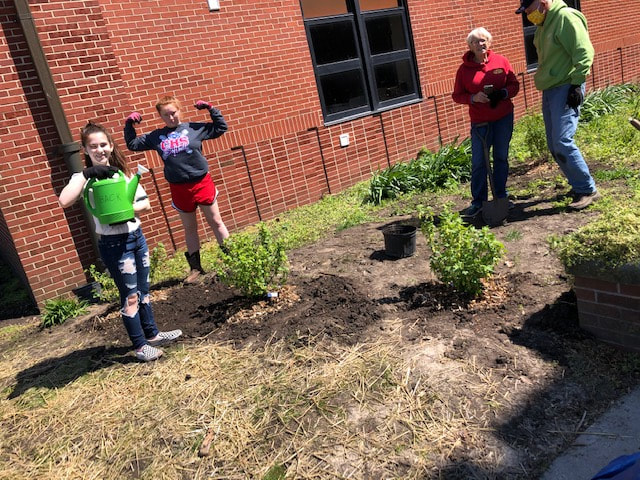
It Takes More Than a Village
Youth from the Carlinville Middle School and High School have assumed site steward responsibilities at the schools’ shared campus. Other sites are cared for by 4-H’ers, FFA members, Interact Club (a High School Club sponsored by Rotary), Boy Scouts, Girl Scouts, church groups, individual families, and the 2020 Carlinville Queens. Business owners also work cooperatively with volunteers to ensure the plants near their establishments on the City Square are cared for.
Other partners who have been the foundation for our success include: MJM Electric Cooperative; Carlinville Community Unit School District #1; Winning Communities, an arm of the Carlinville Chamber of Commerce; and the Billy Bates Memorial Fund.
Involving the whole community is our way of ensuring we WILL become a “Mecca for Pollinators” and a shining example of a small town with a “can do, will do” attitude. All you really need is the will, a small group of committed friends, and some creative connections. Write some grants, connect with local groups, include youth and seniors, and plan to work hard on behalf of the environment. We did, and it’s working!
Youth from the Carlinville Middle School and High School have assumed site steward responsibilities at the schools’ shared campus. Other sites are cared for by 4-H’ers, FFA members, Interact Club (a High School Club sponsored by Rotary), Boy Scouts, Girl Scouts, church groups, individual families, and the 2020 Carlinville Queens. Business owners also work cooperatively with volunteers to ensure the plants near their establishments on the City Square are cared for.
Other partners who have been the foundation for our success include: MJM Electric Cooperative; Carlinville Community Unit School District #1; Winning Communities, an arm of the Carlinville Chamber of Commerce; and the Billy Bates Memorial Fund.
Involving the whole community is our way of ensuring we WILL become a “Mecca for Pollinators” and a shining example of a small town with a “can do, will do” attitude. All you really need is the will, a small group of committed friends, and some creative connections. Write some grants, connect with local groups, include youth and seniors, and plan to work hard on behalf of the environment. We did, and it’s working!




